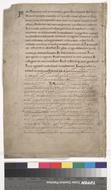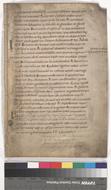Lewis T85 Missal: Saturday after Ash Wednesday, First Sunday in Lent
Title
Missal: Saturday after Ash Wednesday, First Sunday in LentFunders
- Council on Library and Information Resources
Call number
Lewis T85(Philadelphia, United States, Free Library of Philadelphia, John Frederick Lewis Collection of European Manuscripts)
Publisher
Free Library of PhiladelphiaLanguage
LatinOrigin
950-1050
- Place
-
Germany
Notes
- The ancient Greeks had developed a system of musical notation that differentiated between instrumental and sung music, and even indicated rhythmic value. The practice of writing music, as well as the practice of many arts, vanished after the fall of Rome.
- Charlemagne, the first Holy Roman emperor (742-814) restored learning and education to the Western world and the empire over which he reigned. He implemented a standardization of written text and music throughout his empire, which extended through much of modern-day Western and Central Europe. The emperor employed Alcuin, a scholar from England, to run a school and scriptorium in Aix-la-Chapelle, Charlemagnes favored residence. The resulting, highly legible script was Caroline minuscule. A musical notation was developed, too, in the form of the so-called St. Gall notation, named after the abbey in St. Gall, modern-day Switzerland.
- This leaf is written in Caroline minuscule, with unheightened or nondiastematic neumes. Neumes are the earliest notes used in plainchant, which is the monophonic unison chant of the Christian liturgies. Early on, they were squiggles and dots, like the ones displayed here. These neumes do not show the relative pitch between notes, and there is no indicated base pitch. None of these were necessary to the singer, however; the notation served as a reminder of the relative pitches to singers who would already have been familiar with the melody.
- The text is 2 Corinthians 6:1-10, Exhortamur (vos) ne in vacuum gratiam Dei recipiatis. . . (We exhort you that you receive not the grace of God in vain), which is the Epistle of the Mass for the First Sunday in Lent. It is followed by Psalm 90, which is sung as the Gradual of the Mass: Angelis suis mandavit de te ut custodiant te in omnibus viis tuis. . . (God has given His Angels charge over thee, to keep thee in all thy ways).
- Free Library of Philadelphia Lewis Text Leaf 3:85
- The ancient Greeks had developed a system of musical notation that differentiated between instrumental and sung music, and even indicated rhythmic value. The practice of writing music, as well as the practice of many arts, vanished after the fall of Rome.
Support
ParchmentScript
Keywords
- Missal
- Liturgy
- German
- Germany
- 10th century
- 11th century
- Fragment
Licenses
-
- Text
- These images and the content of Free Library of Philadelphia Lewis T85: Missal: Saturday after Ash Wednesday, First Sunday in Lent are free of known copyright restrictions and in the public domain. See the Creative Commons Public Domain Mark page for usage details, http://creativecommons.org/publicdomain/mark/1.0/.
- URL
- http://creativecommons.org/publicdomain/mark/1.0/
-
- Text
- To the extent possible under law, Free Library of Philadelphia, Special Collections has waived all copyright and related or neighboring rights to this metadata about Free Library of Philadelphia Lewis T85: Missal: Saturday after Ash Wednesday, First Sunday in Lent. This work is published from: United States. For a summary of CC0, see https://creativecommons.org/publicdomain/zero/1.0/. Legal code: https://creativecommons.org/publicdomain/zero/1.0/legalcode.
- URL
- https://creativecommons.org/publicdomain/zero/1.0/legalcode
Images
 Lewis T85 reverse
Lewis T85 reverse8562_0001.tif (144.7 MB)
8562_0001_thumb.jpg (4.6 KB)
8562_0001_web.jpg (253.3 KB)

